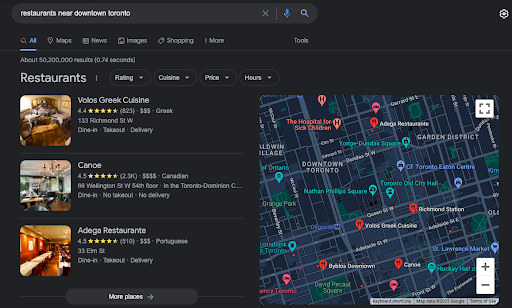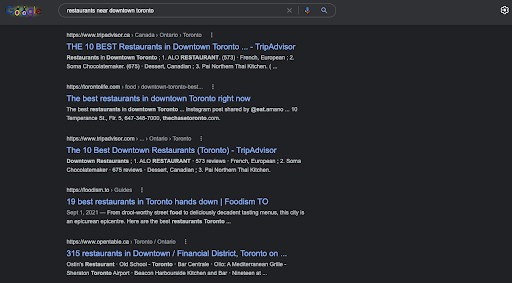Local SEO ranking factors 2022: What affects Google local search engine rankings?
While most businesses today understand the impact that an effective search engine optimization (SEO) strategy can have on their bottom line, not all are aware of the importance of local SEO. However, because 46 percent of Google searches have local intent, it’s clear that optimizing specifically with local searches in mind should be part of any successful search engine marketing (SEM) strategy in order to get higher local search engine rankings.
Become a trusted expert to your clients in the field of local SEO rankings. Download “How to conquer local search engine optimization (SEO): The comprehensive guide” right now.
Here, we’ll go over which local SEO ranking factors have the biggest impact on a business’ search engine rankings. If you provide SEO services to local businesses, they likely serve their geographic region. Providing solutions that address the most important local search engine ranking factors can help you offer real value to your clients by boosting their local SEO rankings and, ultimately, their bottom line.
To sum up, the local SEO ranking factors that have the biggest impact on a business's findability are:
- On-page SEO
- Link signals
- Behavioral signals
- Personalization signals
- Google Business Profile (previously Google My Business)
- Citation signals
- Reviews
Are local SEO ranking factors different from general SEO ranking factors?
Yes, local SEO ranking factors differ from general SEO ranking factors because Google uses a different ranking algorithm for local searches. Once clients understand this, it’s easy to explain the importance of having a strategy that takes local SEO ranking factors into account.
Users making local searches also exhibit higher purchase intent, with a surprising 18 percent of local mobile searches leading to a sale within one day. It's clear that having higher local search engine rankings can be highly valuable for your clients. The relative weights of the local SEO ranking factors we’ll go over here come from Whitespark’s 2021 Local Search Ranking Factors Report published at the end of the year, so they are up to date and relevant to any business or agency offering SEO services to local businesses in 2022.
Local pack rankings vs. organic search rankings
Before getting into the list, it’s worth noting that there are two places on the first page of a local search on Google where a business can appear. The first is called the local pack, or three-pack, and it refers to the three businesses that show up as the top recommendations when a local Google search is conducted. These appear with their Google business info, like Google review rating, price range, and address, next to a map that shows their locations.
The local pack is a coveted spot because of the high visibility it offers the businesses that appear there. It can significantly increase a business's local search engine rankings and web traffic.
The second location is the list of results on the first page for a given local Google search under the local pack, otherwise known as localized organic results. Unlike the local pack results, which are tied to a specific business, these results can be from any kind of page. In this example, rather than specific Toronto-area restaurants, the top organic results are for top-10 lists from travel and food websites.
The way local SEO ranking factors impact local pack rankings differs from how they impact local organic search rankings, so while a robust local SEO strategy that takes all ranking factors into account will boost the likelihood of increasing local search engine rankings for both of these positions, it can be helpful to know if the business you’re working with has a specific goal of ranking on one or the other.
Which local SEO ranking factors affect Google local search engine rankings in 2022?
The local SEO ranking factors that have the biggest impact on a business's findability are:
- On-page SEO
- Link signals
- Behavioral signals
- Personalization signals
- Google Business Profile (previously Google My Business)
- Citation signals
- Reviews
The percentages in the image below indicate the relative importance of that signal to the overall ranking in local pack and local organic search results, respectively. Local pack results are more heavily weighted by the Google Business Profile (Google My Business) listing, reviews, and on-page SEO. Meanwhile, the local SEO ranking factors most important in determining organic search results are on-page SEO, link signals, and behavioral signals.
Let’s get into what each of these local SEO ranking factors takes into account.
On-page SEO
On-page optimization is as important for local SEO rankings as it is for general SEO rankings. Repeating relevant keywords throughout a website, across a range of content, will help a web page increase its traditional and local search engine rankings.
Keyword research can help determine which keywords should be used to get in front of a target audience, and the keywords that rank locally will likely be different from the keywords used as part of a general SEO strategy.
For a website to rank locally, the name, address, and phone number (NAP data) should be consistent across the site. A business’ location, such as the neighborhood, city, state, or any other relevant geographical area, should be repeated throughout the site wherever it can be incorporated into the content.
A focus on using location-specific keywords in headings can be particularly helpful in signaling to Google that this is a local business.
Link signals
Links are another important local SEO ranking factor, particularly when coming from other local businesses that Google recognizes as particularly relevant to the geographic area of a business. Link building is not something that can be completed overnight, but like all effective SEO strategies, it can produce long-term results.
Businesses should only aim to earn links from reputable domains since links from spammy domains can actually hurt rankings.
Behavior Signals
This local SEO ranking factor depends on what people do when they encounter a link to a website. The higher the click-through rate and the more time visitors spend on a page, the more this ranking factor will improve.
Unlike the other local SEO ranking factors on this list, there aren’t tools that can directly manipulate how visitors will behave. Instead, focusing on boosting page load speeds, creating an excellent user experience, and having a complete Google Business Profile that will attract clicks should improve this local search engine ranking over time.
Personalization Signals
Google takes cues from individual characteristics of the searcher, such as their search history and location. General local SEO best practices, such as having complete NAP data, are important, but there is limited manipulation that can be done from an SEO perspective to change these signals.
Google Business Profile
The keys to optimizing for this local SEO ranking factor are:
- Having a complete and optimized Google Business Profile
- Having the correct primary category selected for the business, including additional categories if appropriate
- Incorporating keywords in the business name (if they are in fact part of the business name)
Google Business Profile can continually be updated with images and posts. These may not directly impact search engine rankings, but they can have an impact on click-through rates, which ultimately help both rankings and the clients’ bottom line.
Citation Signals
Citations are mentions of a business's NAP data on websites such as directories. It’s not just the quantity of citations that matters, but also consistency across different citations. If a business has a large number of citations with inconsistent data, such as obsolete addresses and contact information, this can negatively impact local SEO rankings.
Managing these discrepancies is part of online reputation management and can be handled with the help of reputation management software, which manages and syncs citations across the internet. It can be very time consuming and ineffective to try to manage a large number of citations manually.
While this may not be the most important local SEO ranking factor, it’s also important from a general user trust perspective. Users are more likely to trust a business and be willing to spend money with them if the information they find online about the business is consistent.
Reviews
Reviews have become an inescapable part of the online experience, and consumers' are more likely to spend money with a business that has positive reviews over one with negative reviews or no reviews at all. In terms of how reviews impact local SEO rankings, it’s best to have reviews from a variety of sources, not just Google.
It’s important that a business can monitor its reviews so that it can address feedback and problems when they arise. It’s also worth noting that according to data from Google, a mix of negative and positive reviews is better than only positive reviews. Having some negative reviews in the mix makes the positive reviews seem real and trustworthy, whereas a huge number of five-star reviews may seem suspicious.
To get more reviews, businesses should have a system in place for regularly soliciting reviews from their customers.
Delivering results through local SEO ranking factors
There’s no doubt that optimizing for local SEO success is every bit as important as traditional SEO. Like all SEO, success requires ongoing management of the range of ranking factors discussed here.
It isn’t something businesses can set up and forget about. Managing SEO is also time-consuming for many small and medium businesses to handle on their own on top of the daily operations of their business. That’s why 40 percent outsource some or all of their SEO tasks.
Finally, the best results can be found when combining local SEO management with other kinds of search engine marketing, like PPC advertising, to maximize the impact of both. Local SEO optimization strategies make up an important part of a robust marketing system.
[adrotate banner="25"]

